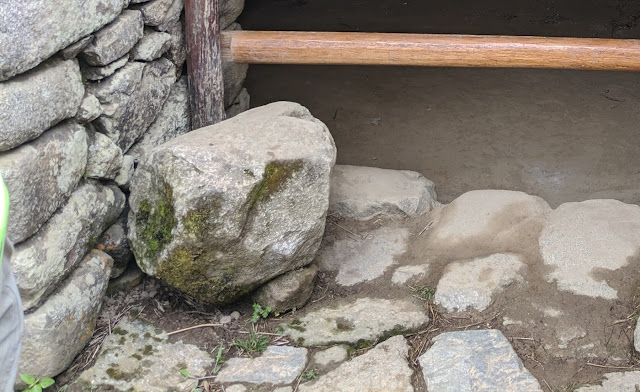To practice using her time power, Hogarth first took Jupiter back to where
he belonged in the 21st century. She didn’t have to be extremely accurate
with her temporal navigation, because he was flexible, but she managed to
land on the target moment anyway. This gave her a better understanding of
how to do it, and when it came time to deliver Ambrose Richardson to his
home universe, she was up to the task. While the team didn’t need either of
them to complete the matrioshka body, had they not shown up, Hogarth would
never have found the solution she was looking for. With this new plan, she
would be able to take a little bit of matter from quadrillions and
quadrillions of different places, all over the universe. Each time she
connected with something, or someone, it would act as a relay point, so she
wouldn’t have very far to go before reaching the next point. The more things
she connected with, the stronger she would become, and the farther out she
would be able to reach through the voids. She could take thousands of
molecules from smaller objects, and billions from others, without causing
even the least bit of disturbance in what she left behind. The structural
integrity of these objects would remain perfectly fine, but once combined,
these molecules would be invaluable towards their goals. She could do this,
as long as she had help.
Ethesh used his technical know-how to build her a machine, and together,
they refined it. It was a chamber inside a room that was to be connected to
every single system in the matrioshka brain. From here, they could control
mirror angle, energy output, even the hallway lights; everything. It only
took the team three weeks to convince the Glisnians to give them access to
all of these things, which they didn’t have to do. Those separate systems
were compartmentalized for a reason, because when together, they would be
too easy to exploit. This put the entire population in danger. They had no
reason to believe anyone would want to sabotage Glisnia, but it wasn’t
outside the realm of possibility. Of course, very few people were allowed in
the room, and the only reason Hilde was one of them was because she was, to
be honest, too incompetent to be of any threat to them. Beyond the walls,
the greatest security contingency ever protected the room from any external
influence, and they used an interesting tactic.
Most security plans assumed one thing; that a given set of people would have
a certain level of access to the inside, and as long as only those people
were accepted, everything would be fine. The problem with that was time. The
longer something existed, the more chances a nefarious entity had to
interfere with it, and that interference often started through some weakness
in the population. A receptionist, for example, might have an ill father,
who needed certain expensive medicine to survive. All an intruder would have
to do was pay for that medication, and the receptionist would let them past
the badged area. There were no receptionists on Glisnia, but the analogy
held. The best way, they figured, to prevent any weak spots in the security
system, was for it to be in constant flux. Robot A will only be on the front
lines for an hour, before it’s removed, and replaced by Robot B. Robot B
will last a day and a half before Robot C comes along, and to keep would-be
intruders on their toes, it will only be around for seven minutes, before
it’s forced to make way for Robot D.
If someone wanted to hack one of these robots to let them in, they wouldn’t
know how long they had before it became useless anyway, forcing them to
start over with something else. Access codes, data transference, and other
vulnerabilities followed the same model by constantly shifting. The most
vital component of this was secrecy. The robots and mechs they used to guard
the room had absolutely no clue what was in it, and the people of Glisnia
predominantly didn’t even know this was happening at all. Some weren’t even
cognizant of the fact that the matrioshka body was in the plans in the first
place. To coordinate, they needed a single person with the brain capacity to
handle the randomized decision gates. Mekiolenkidasola was that someone.
Lenkida, Hogarth, Hilde, Ethesh, and Crimson would be the only people ever
in the room. They would not leave, and literally no one else would be
allowed in, until the job was done. Once it was, the room would be
completely destroyed, and never rebuilt.
They lived there for a month, the mechs surviving on an isolated miniature
fusion power source, and the humans on mostly nonperishable food. They
didn’t want anyone to need any supplies or other resources from the outside.
They had all the tools they required to make sure Ethesh’ machine operated
correctly, and that Hogarth would be able to run it. After countless
simulations, Hogarth was ready to take the penultimate step. She knew she
had access to all the energy in the bulkverse, but she still needed to reach
out to Aitchia once more, to make sure he was cool with it, and to help, if
necessary.
Now that she was organic again, Hogarth couldn’t just scan the QR code on
the back of the Book of Hogarth with her eyes. This was something they
forgot to ask for before the room was sealed, but that was okay. Ethesh had
everything he needed to build a scanner from scratch. After all this, that
was probably the least difficult thing they had to do in here.
“You’re back.”
“Is that okay?”
“Of course,” Aitchai assured her. “The bulkverse belongs to everyone, I just
keep it running.”
“I was gonna ask you for permission, or a favor, or...forgiveness,
depending.”
He grinned. “What do you need?”
“Oh, not much,” Hogarth began, worried how he would react. “Just access to
all the energy in the entire universe.”
“Done.”
“Really? You don’t even wanna know what it’s for?”
He shrugged. “It’s just one universe. It would be like if I asked you for
one of your atoms.”
“That’s kind of what I’m trying to do.” Hogarth then went about telling him
their plan to extract miniscule amounts of matter from everywhere, but not
too much from any one place.
“Diversify!” Aitchai exclaimed. “My finance guy always recommends I do
that,” he joked.
“So, you’re cool with this?”
“I don’t see any problem with it. You’re a bookmaker, you have all you need
to do what you need to do. I wouldn’t go getting a big head about it, or
anything, but I’m happy for ya.”
Hogarth thanked him, and prepared to leave, but stopped. “Just one more
thing. It’s...I don’t know if it’s big or not. I’m not a hundred percent
certain that my friends are a hundred percent certain that you exist.”
“You want proof,” he guessed.
“Have you ever needed to do that before?”
“Tell ya what, you go back to them, and tell ‘em to look out the window.”
“Which one?”
“Doesn’t matter, I’ll know. While they’re watchin’, clap your hands once.
That’ll be my signal.”
“I appreciate this; the signal, and everything.”
“It is a joy.” He smiled like a loving father.
“He wants us to watch the window?” Hilde asked.
“The stars, I believe,” Hogarth assumed.
They didn’t budge.
“What’s the worst that can happen? You’re looking out a window. Or...a
viewscreen.”
Crimson simulated a sigh, and switched on the screen.
“This is realtime, right?” Hogarth confirmed. Their silence answered the
question, so she clapped her hands, as instructed. A beam of light shot out
from one of the stars, and made its way down to another star. A second beam
then came out of the first star, and made its way to a series of other
stars, eventually forming a curve, which stopped back at the second star.
The lines and curves continued from left to right, until a complete
imperative formed, reading DON’T PANIC.
“Holy shit,” Ethesh exhaled.
“Is this authentic?” Crimson questioned.
Lenkida walked over to a nondescript panel on the wall. He opened it up, and
took out what looked like a red landline phone. He held it to his ear. “Did
others just see that?” He waited for a response. “Has it been
authenticated?” He eyed Hogarth as he listened to whoever was on the other
end of the line. “Well, it was proof, in case anyone doubted that we could
do what we said we would do. I know we had a protocol for beginning the
procedure, but I believe this will suffice? Please open the last gate.” He
stayed on the phone for another moment before hanging up, and casually
punching the phone with his fist so hard that it shattered. He looked over
at the team. “We’re a go.”
After completing the launch sequence, Hogarth closed her eyes, and said a
prayer, not to god, but to Aitchai, who could make or break this whole
project. When she was ready, she nodded to Ethesh, who activated the
machine, and gave her access to the whole matrioshka brain. She didn’t need
it to build a body, but things could go awry if the brain and body weren’t
perfectly compatible. Having every qubit of data that the network was
storing—about itself, about everything—was vital in completing this mission
properly. It would allow her to find the right matter from the right places,
and install them at the right spots, to create a seamless transition from
head, to shoulders, to knees, and toes. She could see it all, it was
glorious, and it was exactly what she needed.
She took a chunk out of her own body to start, then moved on to stealing a
little bit from Hilde, and then from everyone else in the room. Then she
continued with every independent entity on the shells, and a little
extraneous matter from the shells themselves. She took some from the star,
and the nearest stars, and their orbitals, and then from Sol, and the rest
of the stellar neighborhood. And still, it was impossible to detect that the
matrioshka was any larger than it was before. She needed more, she needed a
shit ton more. No, she needed a shit ton of a shit ton more, and then she
needed to take that to the power of a shit ton. Every star in the galaxy,
every planet, every moon, every asteroid, every meteor, every comet,
Andromeda, Triangulum, beyond; she took from all of them, and only then did
they notice any progress. She reached out farther, to the rest of the
cluster, and the supercluster, and the hypercluster, and the great wall; all
across the observable universe, and then the rest. Before a man in Tokyo
could finish his morning coffee, it was done. It was all done. The
matrioshka body was complete. It had arms, legs, a torso, a behind, and even
protrusions that resembled breasts. That’s right, the matrioshka was a
woman, which made the most sense since the word meant mother.







